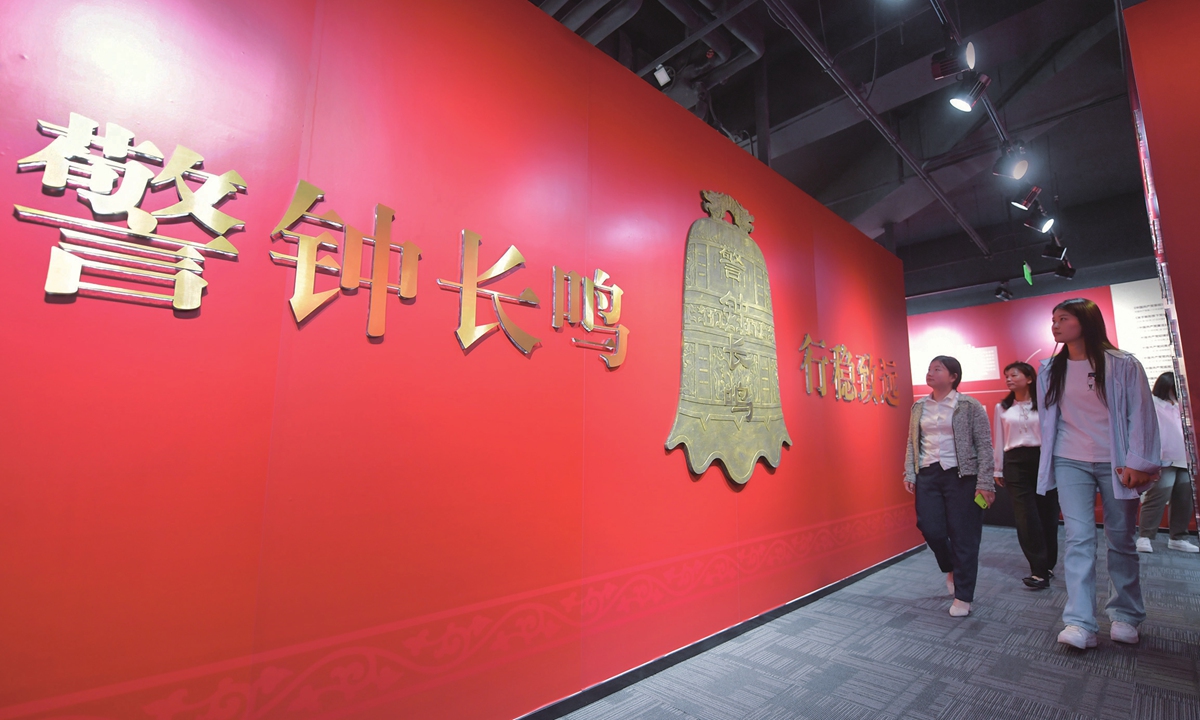
The view of an exhibition hall for corruption prevention education in Yizhuang, Beijing Photo: VCG
Editor's Note:In March, at the invitation of the International Department of the Communist Party of China (CPC), Sujata Koirala (Sujata), leader of the Nepali Congress Party and Nepal's former deputy prime minister and foreign minister, led a delegation from the Nepali Congress on a visit to China. The delegation observed a local CPC committee meeting in Guangying Town of Leshan in Southwest China's Sichuan Province, where the Eight Rules were reflected upon. Global Times (GT) reporters Chen Qingqing, Zhang Changyue and Bai Yunyi interviewed Sujata, and Dev Raj Chalise (Chalise), a leader of the Nepali Congress Party and chairperson of the International College at Pokhara University who was also a member of the delegation, to talk about their understanding about the CPC's Party building and the importance of improving working style.
GT: In March, the CPC launched a Party-wide education campaign to implement its central leadership's Eight-Rules decision on improving work conduct. The CPC released its Eight Rules late in 2012 to combat undesirable work practices. Why do you think the CPC still insists so firmly on emphasizing the Eight Rules on improving work conduct? What does improving work conduct mean for a political party, especially a ruling party?
Sujata: I understand that the CPC's relentless enforcement of the Eight Rules, banning lavish banquets, cutting bureaucratic red tape, and mandating grassroots immersion, reveals a theory of governance renewal.
The fact that the CPC continues to emphasize the Eight Rules more than a decade after its introduction reflects the Party's acknowledgment that good governance and ethical leadership are not one-time goals, but ongoing commitments. Even the most well-intentioned guidelines can lose effectiveness if not periodically reinforced and adapted to changing circumstances. By continually stressing the Eight Rules, the CPC is signaling that it intends to maintain accountability and keep its officials' conduct under scrutiny.
Ultimately, the CPC's ongoing focus on working style demonstrates a desire to uphold discipline and preserve the Party's credibility in the eyes of the people.
At a broader level, any ruling party that aspires to champion the public interest, and thereby remain relevant and effective, must consistently renew, refine, and enforce standards that guide the behavior of its leaders and cadres.
During my meetings with CPC leaders, three lessons emerged, namely rules for eliminating breeding grounds for graft, promotions depending on performance rather than connections, and ensuring a cultural shift. The lesson to learn is that Party discipline is the foundation of public trust.
Chalise: This is a very important question. Government officials in every country should regard themselves not as masters, but as servants of the people. As the saying goes, "Leaders are those who show the way" - meaning their responsibility extends beyond holding a position; they must guide others through vision, sound decisions, and exemplary conduct.
The CPC's Eight Rules focus on reforming working styles, ensuring transparency, accountability, and discipline within the Party. Its aim is to reduce extravagance, maintain close ties with the people, and emphasize public feedback in policymaking. This kind of leadership approach is what makes the CPC more people-centered and credible.
GT: For a political party, improving the working style of its members is not a simple task, as it can make members feel "uncomfortable" or "restricted." Do political parties in Nepal also face similar issues? What insights can be drawn from the CPC's experience in "exercising full and rigorous Party self-governance" for other political parties, including the Nepali Congress party?
Sujata: It is true that improving the working style of party members can lead to discomfort. When stricter regulations and oversight are introduced, it often means individuals can no longer rely on the informal privileges they may have once enjoyed. In Nepal, we have certainly faced similar challenges in various parties, including the Nepali Congress. Implementing stricter codes of conduct, ensuring financial transparency, and holding leaders accountable can sometimes be seen as intrusive or restrictive. Yet without consistent enforcement of such measures, public confidence in political institutions can erode over time. From the CPC's experience with "exercising full and rigorous Party self-governance," one key insight is the value of sustained commitment and clear, consistent standards.
Overhauling a party's culture is never a one-off event; it is a process and requires periodic reinforcement, strong leadership will, and an internal evaluation system that rewards ethical conduct while penalizing violations. This is relevant not just for the CPC but for any political party that aims to maintain public trust. For the Nepali Congress and other parties in Nepal, the lesson is that accountability, discipline and transparency cannot be seen as optional, they are essential for protecting the party's credibility, maintaining public trust, and ensuring that it remains representative of the people's interests. If efforts to improve conduct make some members uncomfortable, it may be a necessary step toward building a healthier political environment that ultimately benefits both the party and the nation.
Chalise: The CPC leadership seems to have realized that extravagance, formality, and corruption will distance it from the people - and thus took disciplinary reform seriously. That's likely why the "exercising full and rigorous Party self-governance" policy was introduced. Governments and parties exist to serve the people.
GT: For years, Western media have expressed curiosity about the CPC's success in governance, especially in internal unity, public engagement, and organizational strength. In your view, what explains this success?
Chalise: What matters is whether a policy improves people's lives. Effective governance requires internal unity, public participation, and strong institutions. For that, government policies and behavior must be people-centric and service-oriented.
China's strong economy, its unprecedented success in global trade, growing geopolitical presence, and impressive defense capabilities have allowed the Chinese people to unite and transform their country into a rising global power. As a neighbor, this is a source of pride for us.




